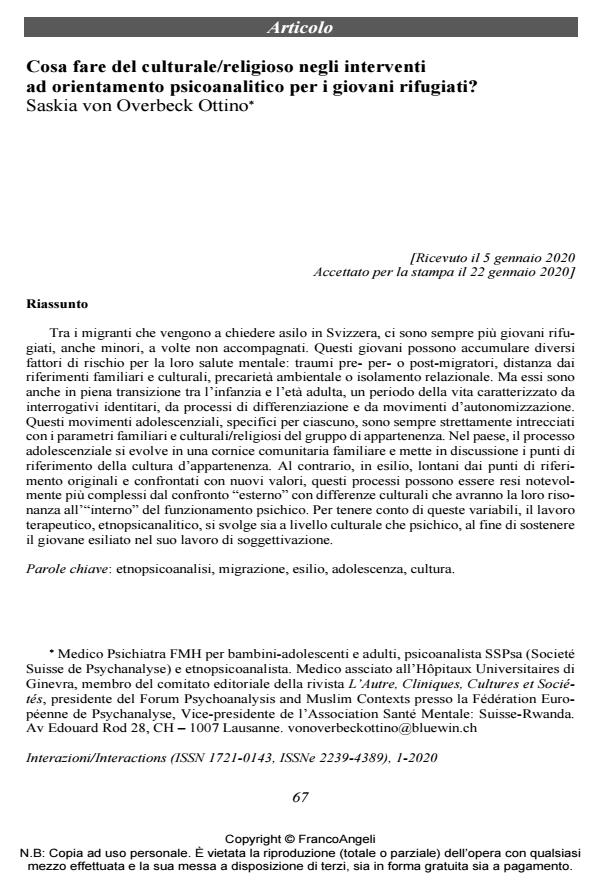What place for the cultural/religious in psychoanalytically-oriented treatment with young refugees?
Journal title INTERAZIONI
Author/s Saskia von Overbeck Ottino
Publishing Year 2020 Issue 2020/1 Language Italian
Pages 14 P. 67-80 File size 209 KB
DOI 10.3280/INT2020-001005
DOI is like a bar code for intellectual property: to have more infomation
click here
Below, you can see the article first page
If you want to buy this article in PDF format, you can do it, following the instructions to buy download credits

FrancoAngeli is member of Publishers International Linking Association, Inc (PILA), a not-for-profit association which run the CrossRef service enabling links to and from online scholarly content.
Among the migrants who come to Switzerland seeking asylum, there are more and more young refugees, even minors, sometimes unaccompanied. These young people may combine different risk factors for their mental health: pre- per- or post-migratory traumas, distance from family and cultural references, environmental precariousness or relational isolation. But they are also in the midst of a transition from childhood to adulthood, a period of life made up of questions of identity, processes of differentiation and movements of empowerment. These ad-olescent movements, while unique, are always closely intertwined with family and cultural/religious parameters of the home group. In the home country, the adolescent process takes place in a familiar community setting and questions the markers of the cultural background. On the contrary, in exile, at a distance from the original landmarks and confronted with new values, these processes may be considerably complicated by the "external" confrontation with cultural differences that will have its resonances in the "internal" of the psychic functioning. In order to take these variables into account, ethnopsychoanalytical psychotherapy will target both the cultural and psychic levels, in order to support the young person in exile in his sub-jectivation process.
Keywords: Ethnopsychoanalysis, migration, asylum, adolescence, culture.
- Devereux G. (1970). Essais d’ethnopsychiatrie générale. Paris: Gallimard.
- Devereux G. (1985). Ethnopsychanalyse complémentariste. Paris: Flammarion.
- Ferenczi S. (1982/1933). Confusion des langues entre les adultes et l’enfant. Le langage de la tendresse etr de la passion. In Ferenczi S., Oeuvres complètes, psychanalyse IV. Paris: Payot.
- Kaës R. (1998). Une différence de troisième type. In Kaës R. et al., Différence culturelle et souffrance de l’identité. Paris: Dunod.
- Kaës R. (2007). Un singulier pluriel: la psychanalyse à l’épreuve du groupe. Paris: Dunod.
- Kaës R. (2015). L’extension de la psychanalyse: pour une métapsychologie de troisième type. Paris: Dunod.
- Moro M.R. (1998). Psychothérapie transculturelle des enfants de migrants. Paris: Dunod.
- Nathan T. (1986). La folie des autres. Traité d’ethnopsychiatrie clinique. Paris: Dunod.
- Overbeck Ottino von S. (1999). Violences collectives et travail psychothérapique: nécessité d’une intégration des aspects individuels, familiaux et culturels. Psychothérapies, 19, 4: 235-245.
- Overbeck Ottino von S., Ottino J. (2001a). Avoir ou être, tribulations identitaires chez les adolescents migrants. L’Autre, Cliniques, Cultures et Sociétés, 2, 1: 95-108.
- Overbeck Ottino von S. (2001b). Mémoires d’exil: des projections parentales aux projections culturelles. Tribune Psychanalytique, 3: 51-66.
- Overbeck Ottino von S. (2007). Violences extrêmes: le poids de la réalité à l’épreuve de la causalité psychique. Psychothérapies, 27, 3: 127-138.
- Overbeck Ottino von S. (2008). Inconscient et culture: psychothérapie complémentariste. Actualités Psychosomatiques, 11: 109-128.
- Overbeck Ottino von S. (2014). Corps privé, corps public: enjeux ethnopsychanalytiques. In Press J. (Ed.), Corps culturel, corps malade. Chêne-Bourg: Georg.
- Overbeck Ottino von S. (2020). Devenir psychique des jeunes réfugiés: places et fonctions des adultes. Cahiers de Psychologie Clinique, in stampa.
- Rouchon A.F., Reyre A., Taieb O., Moro M.R. (2009). L’utilisation de la notion de contre-transfert culturel en clinique. L’Autre, Cliniques, Cultures et Sociétés, 10, 1: 80-89.
- Santa Ana de I. (2015). Etre adolescent loin de chez soi et des siens: subjectivation et remaniements identitaires. L’Autre, Cliniques, Cultures et Sociétés, 16, 2: 161-171.
- Mineurs non accompagnés Saskia von Overbeck Ottino, pp.275 (ISBN:9782848358130)
Saskia von Overbeck Ottino, Cosa fare del culturale/religioso negli interventi ad orientamento psicoanalitico per i giovani rifugiati? in "INTERAZIONI" 1/2020, pp 67-80, DOI: 10.3280/INT2020-001005